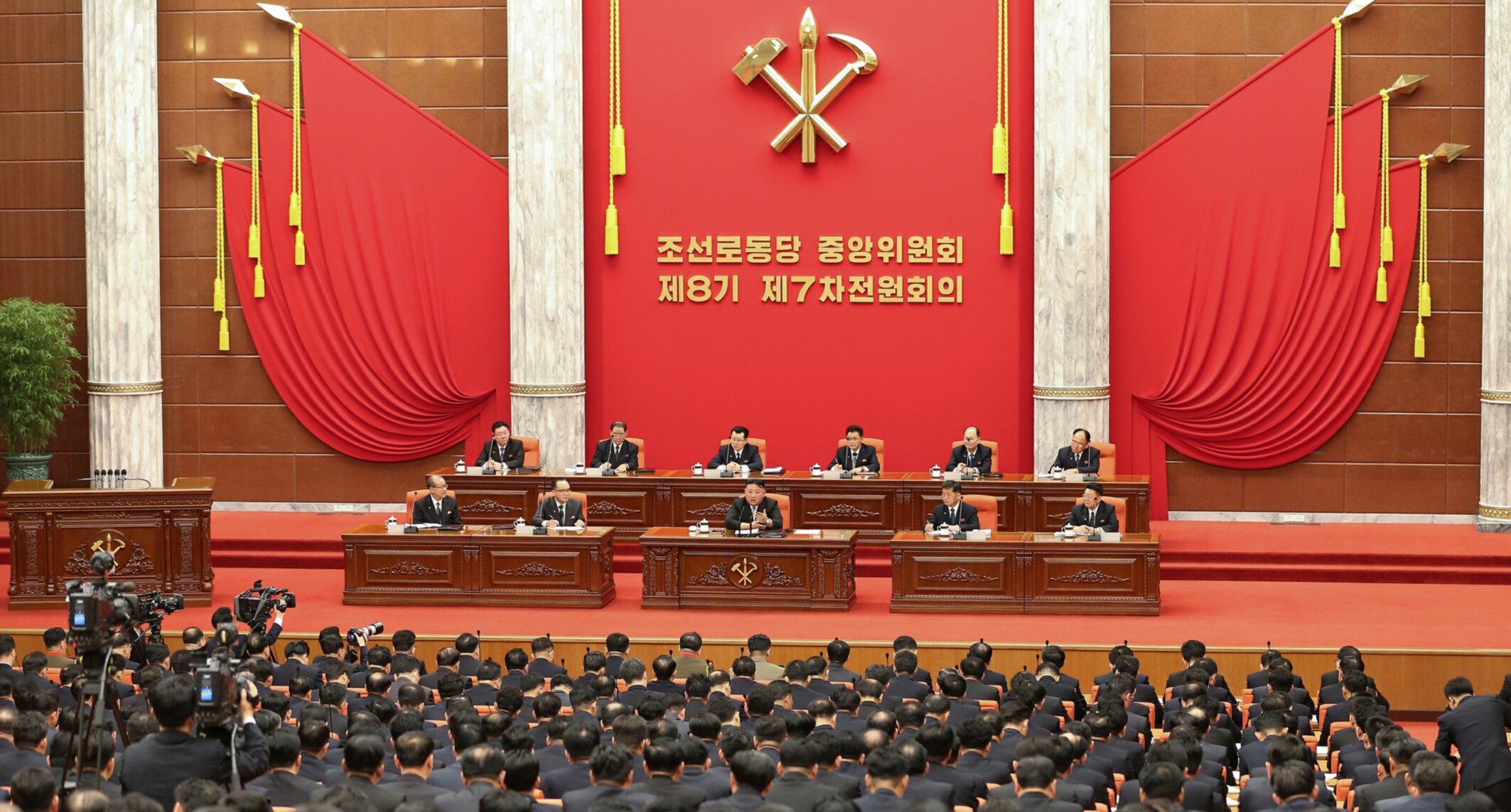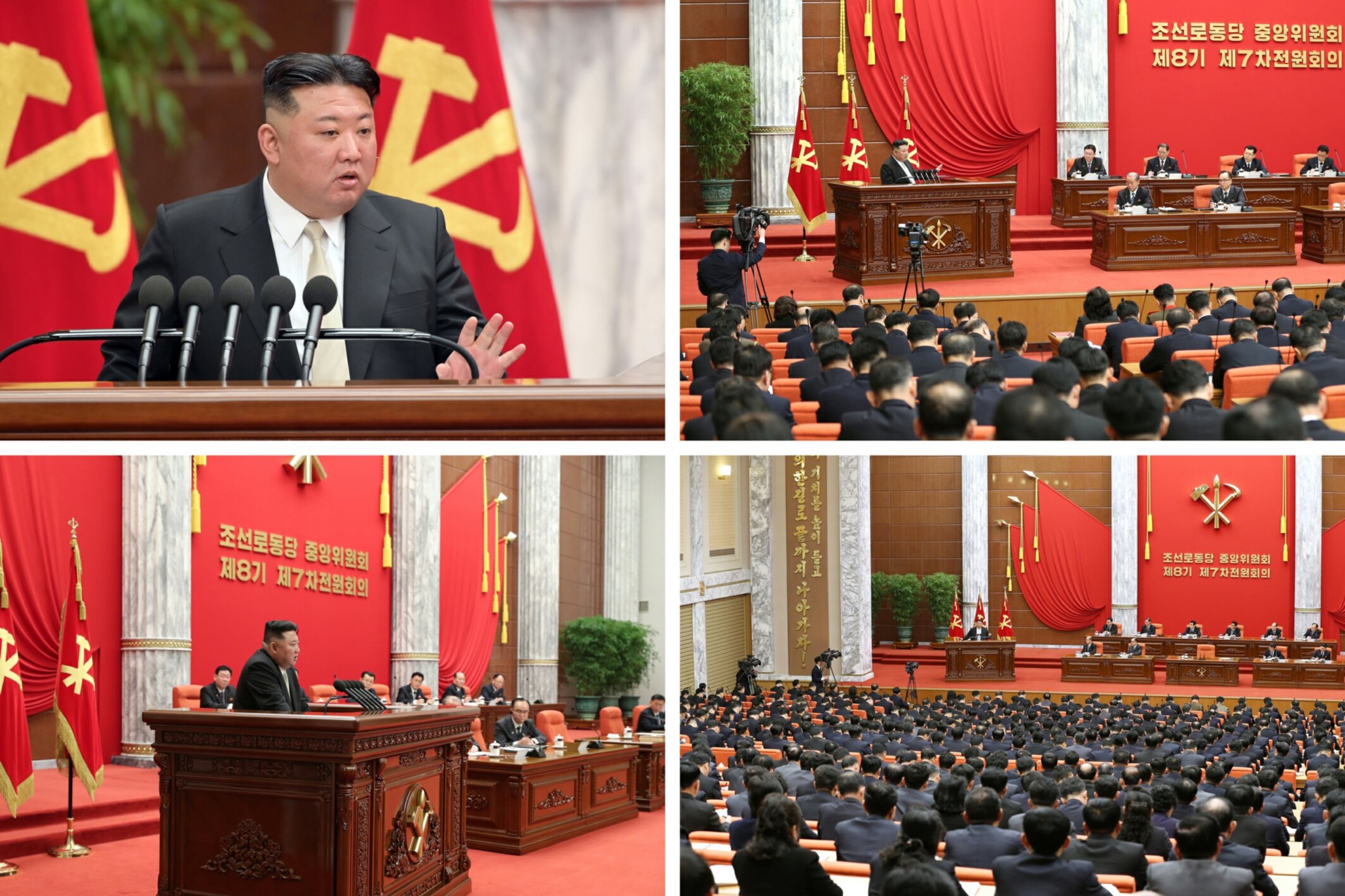Day Two at the CC Plenum

View of the platform during the second day of the 7th plenum of the WPK 8th Central Committee on 27 February 2023. First row (L-R): WPK Secretary for Propaganda and Agitation Ri Il Hwan; WPK Secretary for Organizational Affairs Jo Yong Won; DPRK Premier Kim Tok Hun; WPK Secretary for Military Affairs Ri Yong Gil. Second Row (L-R): WPK Agriculture Department Director Ri Chol Man; WPK Secretary for Science and Education Pak Thae Song; Central Inspection and Audit Commission Chairman Kim Jae Ryong; WPK Secretary for Economic Affairs Jon Hyon Chol; State Planning Commission Chairman and DPRK Vice Premier Pak Jong Gun; Agriculture Commission Chairman and DPRK Vice Premier Ju Chol Gyu (Photo: Rodong Sinmun/KCNA).
The second day of the 7th plenary meeting of the 8th Workers’ Party of Korea [WPK] Central Committee took place in central Pyongyang on 27 February (Monday). Kim Jong Un (Kim Cho’ng-u’n; KJU) once again attended and presided over the meeting. As the Central Committee has yet to take up ominous “Organizational Matters,” no one was tossed off the plenum’s presidium (Pak Jong Chon-style).
The plenary meeting’s second day started with speeches about the first year (2022) of implementation of the WPK’s rural development policies. WPK Secretaries Jo Yong Won (Cho Yo’ng-wo’n), Ri Il Hwan (Ri Il-hwan) and Pak Thae Song (Pak T’ae-so’ng) took to the lectern where they “analyzed the shortcomings revealed by relevant sectors and units in the course of carrying into practice the Party’s new rural development strategy and their causes and lessons.” They “proposed to the plenary meeting the measures to be taken.”
According to DPRK state media, other undisclosed senior officials “in various sectors made written speeches.” However, one Korean Central Television [KCTV] news item on the second day of the plenum did not show any speakers and there was no reporting or excerpts of the other senior officials’ remarks in Rodong Sinmun or Minju Joson.
KJU delivered some concluding remarks about the plenary session’s first agenda item. He said that the “main purpose of the current enlarged plenary meeting is to find the immediate tasks and scientific long-term objectives and ways with perfect feasibility for successfully attaining the grain production goal this year and bringing about a radical change in the agricultural production within a few years and thus laying a foundation for the stable and sustained development of agriculture.” He mentioned the “importance and significance of the growth of the agricultural productive forces and the development of rural communities in ensuring the comprehensive development of socialist construction.”

Kim Jong Un expressed “the fixed determination and will of the Party Central Committee to bring about a revolutionary turn in the agricultural production without fail” and said that “nothing is impossible as long as the strong leadership system is established in the whole Party and there is the united might of all the people.”
According to KCNA, KJU’s remarks “which comprehensively dealt with the revolutionary struggle strategies for the rural development, will serve as the guide to action guaranteeing signal strides in implementing the program for rural revolution in the new era and as inspiring militant banner that brings earlier a phase of the rapid development of rural communities and powerfully propels the dynamic advance of our state.” Meeting participants “showed their full support and approval to the General Secretary’s conclusion running through with the steadfast faith and will to build a powerful and rich nation by our own efforts for the self-respect of our state and well-being of the people.”
After KJU’s remarks, the Central Committee plenum took up the second item on the meeting agenda which was a discussion of “thoroughly establishing a discipline of implementing the national economic plan.” It then dealt with the plenum’s third agenda item which are “immediate matters for improving the state financial work.” According to DPRK state media the plenary meeting “is arousing the absolute response and favor of its participants as it is due to adopt development guidelines and bold practical measures for firmly adhering to the nature of the socialist economy, the independent national economy which is the material foundation and lifeline of our state’s existence, and for steadily augmenting its own strength.”
It seems that the 7th plenary session of the 8th Central Committee will hold its breakout sessions with the sideline consultative meetings on the three agenda items “before adopting them through its final deliberation.” Plenum meeting participants showed “their sincere attitude toward the meeting, with high political consciousness to bring about a real change and substantial progress in the agricultural development and the economic construction by fulfilling their heavy responsibility and duty, seriously reviewing the work of their sectors and units for implementing the Party’s economic policies.”